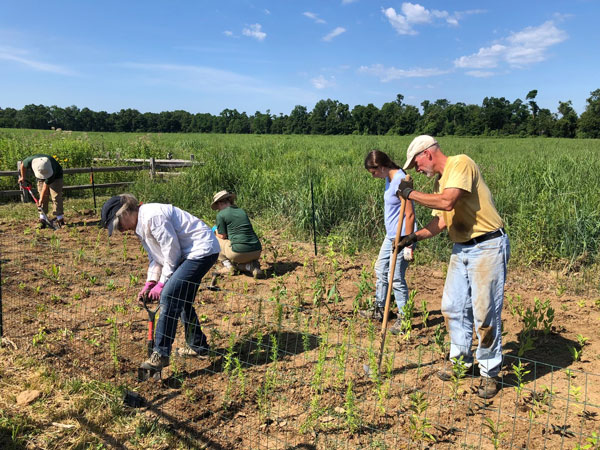Pollinator Garden Project
 Pollinators such as native bees, butterflies and moths are declining at an alarming rate due to habitat loss, pesticide use and climate change. One significant cause of these declines on Long Island can be traced to shrinking habitat that provides floral and nesting opportunities.
Pollinators such as native bees, butterflies and moths are declining at an alarming rate due to habitat loss, pesticide use and climate change. One significant cause of these declines on Long Island can be traced to shrinking habitat that provides floral and nesting opportunities.
In recognition of these declines and of the pollinators’ indispensable value of pollinating wild flowering plants necessary for their reproduction and survival, the Long Island Community Foundation (LICF) awarded a grant to The Caumsett Foundation in 2021. These funds were used to supplement and improve the habitat which supports native pollinators through native Long Island wildflower plantings and invasive plant removal. The LICF grant expands upon a partnership begun in 2019 with the Three Harbor Garden Club (THGC) to increase the floral component of a 4-acre field known as Bull Pen field which was dominated by grasses and non-native plants. With funds secured from the Garden Club of America, both organizations worked together to install small pollinator gardens to serve as reservoirs for bees and other pollinators.
In 2022, two new pollinator gardens were added along Fisherman’s Road that now contains over 650 native wildflowers within 700 square feet of formerly mowed lawn. One garden was planned and installed by an Eagle Scout from Huntington. The second garden was planted by volunteers and our two summer environmental interns with plants provided by Bethpage State Park’s horticulturist. Garden sites are first solarized for at least 8 weeks, then raked and planted. Six-foot tall wire fencing is installed around each garden due to heavy deer pressure. Observations have shown that plants in the mint family including wild bergamot (Monarda fistolosa), slender mountain mint (Pycnanthemum tenuifolium) and hairy mountain mint (Pycnanthemum verticillatum) are not browsed by the deer. Plans to use these species as an outside buffer for new and some existing gardens will be implemented in the summer of 2023.
Pollinator Census
The ongoing effort to establish a pollinator database continues at Caumsett. Initiated in 2021 this database is instrumental in the ecological management of the Park. To date, 244 pollinator species have been recorded within the Park. This survey can be viewed online at iNaturalist, a joint initiative of the California Academy of Sciences and the National Geographic Society.


